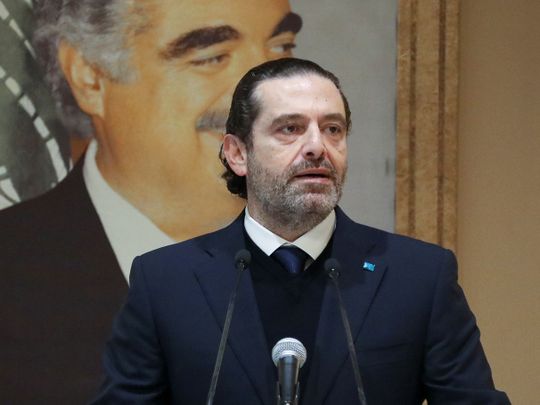
Beirut: Leading Lebanese Sunni Muslim politician Saad Hariri said on Monday he would not run in a forthcoming parliamentary election and was suspending his role in political life, calling on his political party to do the same.
"We will continue to serve our people, but our decision is to suspend any role in power, politics and parliament," Hariri said in a live televised address.
Three times Lebanon's prime minister, Hariri called on his Future Movement not to run any candidates in the election.
Hariri has served three times as prime minister, but his political fortunes have waned in recent years, with his position weakened by the loss of Saudi support.
"I am convinced that there is no room for any positive opportunity for Lebanon in light of Iranian influence, international disarray, national division, sectarianism, and the collapse of the state," he said.
"We will continue to serve our people, but our decision is to suspend any role in power, politics and parliament," Hariri said in a live televised address, his voice breaking with emotion as he spoke in front of a portrait of his father.
Hariri, 51, inherited the political mantle of his father, Rafik, after his assassination in 2005, becoming the leading Sunni Muslim in Lebanon's sectarian politics. In 2020, a UN-backed tribunal convicted a member of the heavily armed, Iran-backed Shiite group Hezbollah of conspiring to kill Rafik Hariri.
His early years in politics were defined by his close alliance with Saudi Arabia and confrontation with Lebanese allies of Syria and Iran, chief among them Hezbollah. He led a Western-backed Lebanese alliance called "March 14". Tensions spilled into a brief armed conflict in 2008, during which Hezbollah took over Beirut.
He formed and led his first coalition government in 2009 after March 14 won a parliamentary majority.
Stayed outside Lebanon
That cabinet was toppled in 2011 when Hezbollah and its allies quit over tensions linked to the UN-backed tribunal. For several years, he mostly stayed outside Lebanon on security grounds. He was strongly critical of Hezbollah's role fighting in support of Syrian President Bashar Al Assad.
Having led opposition to Hezbollah's arsenal for years, Hariri was widely seen to set the issue aside as he began to make political understandings with Hezbollah and some of its allies.
This resulted in a deal in 2016 that made the Hezbollah-allied Christian politician Michel Aoun president, with Hariri becoming prime minister for a second time.
While continuing to oppose Hezbollah's possession of arms, Hariri described the arsenal as a regional matter bigger than Lebanon, where he said the focus should be on tackling economic problems. Anti-Hezbollah hawks accused him of compromises and abandoning the principles of March 14.
His political network in Lebanon, including media outlets, began suffering a financial crisis around 2015. This was a sign of the collapsing fortunes of Hariri's Saudi-based construction firm Saudi Oger, the source of the wealth that helped make Rafik Hariri Lebanon's leading Sunni after the 1975-90 civil war.
Financially weakened, Hariri's Future Movement lost more than a third of its seats in a 2018 parliamentary election. But he remained the biggest Sunni player, and led another coalition cabinet.
His last spell as prime minister ended in 2019 when Hariri resigned in response to mass protests against the ruling elite, which erupted as Lebanon sank into financial crisis. Hariri's ties with Aoun soured badly, and Hariri wanted Aoun's son-in-law, Gebran Bassil, and other leading politicians removed in a government reshuffle, to be replaced with technocrats.
Hariri and Bassil blamed each other for obstructing reforms that could have averted the financial crisis.












